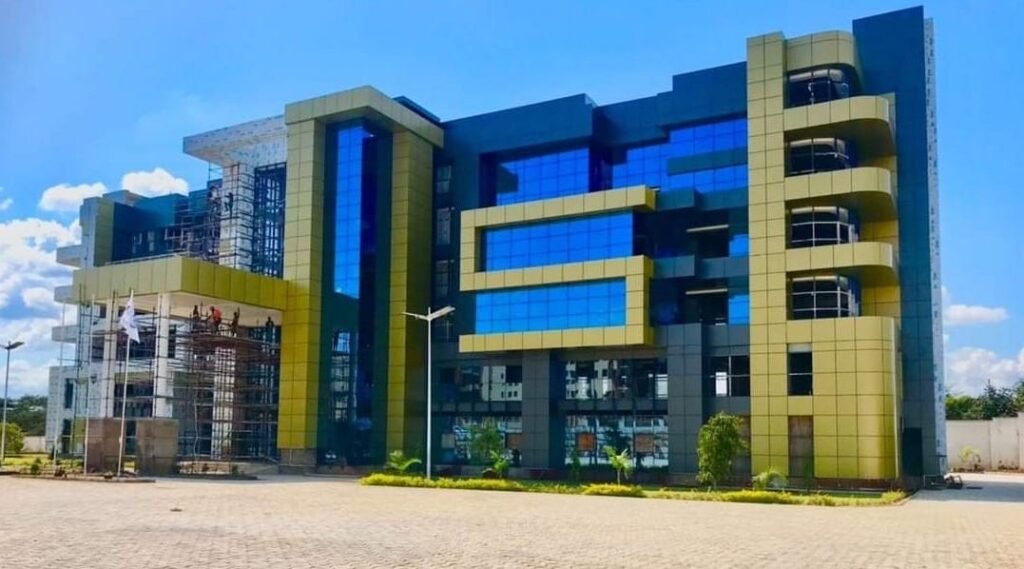Tech
Unlocking Business Potential: Embracing Technology and Automation
In an era driven by rapid technological advancements, businesses are presented with an unprecedented opportunity to revolutionise operations and enhance productivity

In an era driven by rapid technological advancements, businesses are presented with an unprecedented opportunity to revolutionise operations and enhance productivity. Gone are the days when tasks lingered, consuming valuable time and resources. The strategic implementation of technology and automation has emerged as a powerful catalyst for growth, streamlining processes, and elevating business outcomes across various departments.
1. A New Era of Efficiency:
Traditional workflows can be burdensome, often leading to delays and errors. Embracing technology enables businesses to optimise their processes, minimise human errors, and significantly speed up task completion. Whether it’s automating inventory management, invoice processing, or customer service responses, technology empowers businesses to do more with less, ultimately boosting efficiency.
2. Empowering Human Capital:
By automating routine and mundane tasks, employees are freed from repetitive chores, allowing them to focus on high-value, strategic initiatives. This not only boosts their job satisfaction but also harnesses their creativity and problem-solving abilities, driving innovation and adding a competitive edge to the business.
3. Enhanced Customer Experiences:
Technology-driven automation doesn’t just benefit businesses internally; it also greatly improves customer experiences. Automated responses and personalised interactions can lead to quicker query resolution and heightened customer satisfaction. Businesses that invest in technology to better understand their customers can tailor their offerings, leading to stronger relationships and increased loyalty.
4. Data-Driven Decision Making:
The wealth of data generated by technological systems provides invaluable insights into various aspects of a business. Leveraging this data enables informed decision-making, allowing businesses to identify trends, opportunities, and areas that require optimisation. This data-driven approach enhances strategic planning and overall business agility.
5. Cross-Departmental Integration:
Embracing technology fosters seamless communication and collaboration across different departments. Information flows effortlessly, facilitating a holistic view of business operations. This integration not only eliminates information silos but also promotes synergy among teams, ultimately driving unified goals.
6. Sustainability and Scalability:
Modern businesses must also consider their environmental footprint. Automation helps reduce resource consumption, minimise waste, and optimise energy usage. Additionally, by adopting scalable technology solutions, businesses can easily adapt to changing market demands and expand their operations without significant disruptions.
7. The Role of ChatGPT:
In the realm of content creation and research, tools like ChatGPT prove to be invaluable assets. They can swiftly generate well-researched articles on various subjects, saving time and effort. By utilising such technologies, businesses can focus on delivering insightful content without compromising on quality.
In conclusion, the future of business lies in the strategic integration of technology and automation. Embracing this transformation unlocks a world of possibilities, from heightened efficiency and improved customer experiences to data-driven insights and sustainable growth. It’s time for businesses to seize the opportunities that technology offers and propel themselves into a future of unparalleled success.
Stay tech-savvy, stay ahead.
Tech
British PM Rishi Sunak Plans to Tackle AI Rising Concerns
The worst-case scenario would result in a loss of human control over AI, leading to far-reaching consequences. This sobering reality serves as a warning from experts.

This morning, British Prime Minister Rishi Sunak delivered a speech at the Royal Society in London, addressing the challenges presented by AI. He emphasised the critical role of governments in collectively addressing the potential threats to humanity. The creators of AI technology have identified a significant risk: if this technology falls into the wrong hands, it could be misused. Terrorists can develop chemical or biological weapons, create widespread fear and disruption on an unprecedented scale. The worst-case scenario would result in a loss of human control over AI, leading to far-reaching consequences. This sobering reality serves as a warning from experts.
Sunak spoke in anticipation of a global gathering he will convene next week to assess the risks associated with technology. He expressed the hope that participants would reach a consensus on the nature of these risks and establish a global panel to evaluate them.
In response to these challenges, Britain is planning to establish an Artificial Intelligence Safety Institute. This institute will play a pivotal role in examining, evaluating, and testing new AI models to comprehensively understand their capabilities, addressing risks ranging from social biases and misinformation to the most extreme potential dangers. The UK Government has allocated £100 million in funding for a new AI safety task force, with the aim of becoming the world’s safest country for conducting AI-related businesses.
Representatives from AI companies, political leaders, and experts will gather at Bletchley Park, a historic site known for the World War Two codebreakers’ work, on November 1-2. Sunak stressed the importance of getting AI safety right to prevent the misuse of technology for creating chemical or biological weapons, and to avert the unlikely but extreme scenario of losing control over AI.
Rishi Sunak envisions the UK as a global leader in AI safety, positioning the country to play a significant role in this domain following Brexit, while bridging the gap between the economic blocs of the United States, China, and the European Union.
The upcoming meeting of around 100 participants will focus on various subjects, including the unpredictable advancements in AI and the potential for humans to lose control over it. Sunak also revealed substantial investments in advanced computing technology, with nearly a billion pounds allocated for a supercomputer that is thousands of times faster than a typical home computer, and an additional £2.5 billion directed toward quantum computing, which promises exponentially greater speed.
Although China has been invited to the gathering, Sunak couldn’t guarantee the country’s participation. Notable attendees include U.S. Vice President Kamala Harris and Google DeepMind CEO Demis Hassabis.
Leaders of the Group of Seven (G7) economies, comprising Canada, France, Germany, Italy, Japan, Britain, the United States, and the European Union, have previously called for the adoption of standards to ensure trustworthy AI and the establishment of a ministerial forum known as the Hiroshima AI process.
Tech
Aviation Breakthrough as Africa’s Largest Drone Takes Flight
Milkor, a prominent defence conglomerate in South Africa, has solidified its global presence in the aerospace sector as a formidable contender.

Milkor, a prominent defence conglomerate in South Africa, has solidified its global presence in the aerospace sector as a formidable contender. Headquartered in Pretoria, this defence equipment manufacturer, specializing in land, air, sea, and cyber weaponry, has achieved a remarkable feat by becoming the first African company to produce the largest drone with an impressive payload.
After a lengthy production period of three years and seven months, the first-ever Made-in-Africa drone, the Milkor 380, has successfully completed its maiden flight. This significant achievement marks a remarkable milestone in drone technology, particularly for the African continent. The Milkor 380 boasts an expansive wingspan of 18.6 meters, an impressive continuous flight time of up to 35 hours, a substantial range reaching 2,000 kilometres, and a maximum altitude of 9,000 meters.
Milkor is presently conducting regular test flights and aims to have four drones ready for the market by the end of 2023. Operated remotely from the ground by a team of three operators—a pilot, a commander, and an onboard equipment controller—the Milkor 380’s size plays a crucial role in determining its carrying capacity. Daniel du Plessis, the company’s business development manager, emphasized the significance of the drone’s size, stating that a larger drone can accommodate heavier sensors and even weapons, thus broadening its operational capabilities.
Equipped with advanced infrared and high-resolution cameras, the Milkor 380 is designed to undertake a diverse range of tasks, including observation, intelligence gathering, reconnaissance, and offensive missions. Its applications extend to conservation efforts, anti-poaching measures on land and sea, as well as border control operations.
The recent launch of the Border Management Authority by South African President Cyril Ramaphosa underscores the crucial need for enhanced security measures at the nation’s borders, particularly in curbing illegal immigration and various criminal activities. Locally manufactured drones, such as the Milkor 380, are poised to play a pivotal role in addressing these challenges, offering customizable solutions tailored to the specific needs of various African countries.
In addition to the drone’s capabilities, Milkor provides a range of services to potential buyers, including comprehensive maintenance programs, logistics support for fuel and spare parts, operator training, and the establishment of satellite and ground-based communication infrastructure.
While the pricing details remain undisclosed, it is evident that the value proposition of Milkor’s drones aligns with their robust features and capabilities. Notably, these drones are entirely manufactured in South Africa, underscoring the continent’s burgeoning potential and its growing significance as a key player in the global technological landscape. This milestone signifies Africa’s substantial contributions and its pivotal role as an active participant, rather than a mere observer, in the realm of cutting-edge technology.
Tech
Inspiring Journey of Wisely Phiri and the Rise of Sparc Systems Limited, Malawi
Malawi’s remarkable strides in the realm of technology signify Africa’s potential to stand as an equal on the global stage.

Malawi’s remarkable strides in the realm of technology signify Africa’s potential to stand as an equal on the global stage, provided that funding opportunities are made available to the continent. Wisely Phiri, a determined and driven visionary, defied all obstacles and shattered barriers, emerging as one of the few in Africa to achieve such remarkable success mere years after the launch of his technology enterprise. Born into a large family in the remote villages of Malawi, Wisely’s journey was far from easy.
From an early age, he understood that the world didn’t favor those from his background. However, his relentless drive for success burned brighter than any odds stacked against him. Raised by a single mother, he imbibed the values of hard work and perseverance, laying the foundation for his extraordinary path ahead. His affinity for IT first sparked during his high school years, eventually leading him to embark on a journey in 2013 that would give birth to Sparc Systems Limited, an IT company that would soon become a trailblazer, not just in Malawi, but across the entire African continent.
During his acceptance speech upon receiving a Doctor of Philosophy from UNICAF University, Wisely Phiri shared his unwavering belief that one’s background should never dictate their potential. Over the course of a decade, Sparc Systems Limited has witnessed exponential growth, all attributed to the unwavering dedication of its leadership and relentless team. Under Wisely’s capable guidance, the company expanded into Zambia and Rwanda, firmly establishing Malawi’s presence in the ever-evolving IT sector. Young trailblazers like Wisely are a testament to Africa’s ascent, proving that the continent can lead the charge in technological innovation rather than playing catch-up with the rest of the world. Sparc Systems achieved numerous milestones, from inaugurating their cutting-edge headquarters in the capital city of Lilongwe to fulfilling a heartfelt promise close to Dr. Wisely Phiri’s heart.

One of the company’s most impactful initiatives is the UCS Sacco system, a tailored solution for the financial sector. Addressing the challenges faced by financial institutions in Malawi, Sparc Systems stepped in with digital solutions. The UCS Sacco system provided a lifeline for thousands of civil servants and employees from parastatals across Malawi who struggled to manage their financial records, offering easy access to crucial account information and empowering them in their financial planning processes.
However, Sparc Systems’ journey didn’t halt there. They remain at the forefront of developing innovative technologies that significantly impact various businesses and institutions. Their latest creation, SARIS (SPARC’s Academic Records Information System), aids educational institutions in efficient academic record management. From student reports and results to attendance records, appraisal performance, exam data, fees records, admission information, and accommodation details, SARIS streamlined record-keeping, boasting a user-friendly interface accessible on both mobile and computer platforms.
Ever mindful of the importance of giving back, Dr Wisely Phiri sought to make a meaningful contribution to his former primary school. Upon learning that 120 students at Kibwe Primary School had no classrooms due to overpopulation, he intervened and constructed new school blocks, equipping them with over 320 desks and chairs, accommodating present and future students alike. This gesture evoked overwhelming gratitude from students, parents, and the entire community, marking an emotional moment for Dr Wisely Phiri as he honored his promise and gave back to the community that had nurtured him, all made possible by the success of Sparc Systems Limited.
The tale of Wisely Phiri and Sparc Systems Limited serves as a testament to the potency of determination, innovation, and the spirit of giving back to one’s roots. In the heart of Malawi, a technological powerhouse had emerged, breaking barriers and inspiring countless others to defy the odds and pursue their aspirations.
















